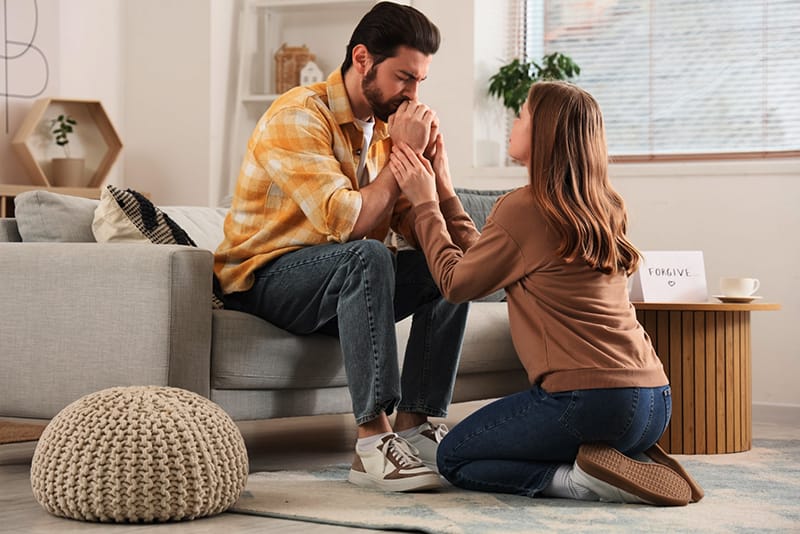All relationships have their highs and lows, and sometimes we need to say those two small words: I’m sorry. But do you know how to apologize to your boyfriend in a way that really repairs the relationship and can lead to it growing, healing, and evolving? In this ultimate apology guide, we will discuss the art of apologizing effectively, including how to make your sorry more than just words. Whether something minor has been misconstrued or a bigger issue, these approaches will help you move through it with confidence and care.

Why Apologizing is Important?
Saying sorry is not simply about uttering the words; It’s also a part of making love passages together. Sincerely saying sorry can help you move on, repair trust, and demonstrate maturity. Here’s why it matters:
- Builds Trust: When you take responsibility for your actions, you demonstrate to your boyfriend that you are indeed accountable, and his trust in the relationship strengthens.
- Strengthens the Relationship: A sincere apology shows your dedication and makes you feel more connected.
- Resolves Conflicts: Apologies aid in resolving conflicts before they escalate to something worse: resentment.
- Demonstrates Maturity; Extends The Partnership: Admitting a mistake requires humility and emotional intelligence, which furthers your partnership.

For example, if you forget a significant date, saying you’re sorry will let your boyfriend know that you care about his feelings and open the door for a resolution. Roots Relational Therapy believes that being vulnerable in an apology is an invitation for your partner to reengage and a safe place for healing.
Common Apology Mistakes
But before we look at the process and ways of learning to say sorry correctly, it would be helpful to familiarize yourself with what NOT to do when you sincerely apologize. Here’s how to sidestep them so your apology is adequate:
- Apologizing Without Really Apologizing: An inauthentic apology will be detected and may worsen things.
- Making Excuses: “I’m sorry, but…” In most cases, the word “but” means that the apology isn’t genuine, and you’re shifting blame.
- Demanding Instant Forgiveness: Asking your boyfriend to immediately forgive you puts him under pressure.
- Not Changing Behavior: An apology feels hollow when the mistakes are repeated and not addressed.

For example, “I’m sorry I was late, but traffic was terrible,” takes the focus off your apology as an explanation (which can irritate your boyfriend that you’re making it about you.) According to data collected by Verywell Mind, genuine apologies do not shift the blame to preserve the trust.
Steps to a Genuine Apology
A genuine apology contains empathy, accountability, and a promise to change. The following are some crucial steps in offering a sincere apology to your boyfriend:
1. Apologize: Repent earnestly with an apology, opening with “I’m sorry” and explaining precisely what you’re sorry for. For instance, “I’m sorry I yelled at you before.”
2. Take Responsibility: Acknowledge that you are responsible and avoid making excuses. Say, “I was off in responding and should have controlled my frustration.”
3. Acknowledge It: Demonstrate that you know how you hurt him. Such as, “I know I made you feel disrespected with my words, and that’s not what I want.”
4. Make It Right: Offer to fix the situation, for example, “Is there anything I can do to make it right?”
5. Pledge to change: Reassure him that you will try not to make the same mistake. For instance, “I’m going to manage my stress better, so I don’t get this.”
6. Be Open to His Emotions: Allow him to share his feelings without interjecting, making him feel like his point of view has value.
7. Be Patient: Forgiveness may need time. Don’t rush him to “get back on the horse.”
Inspired by love and respect, these steps ensure your apology is heartfelt and compelling. For instance, if you snapped at your boyfriend in public, express, “I’m sorry for snapping at you in front of our friends. I know it shamed you, and I was wrong. I will work on remaining calm, and I would love to hear how you feel about it.”

How to Say Sorry in Different Situations?
The route to apologize might differ depending on the circumstances. Here’s what to do in varying situations:
- Small Misunderstandings: For minor incidents, such as forgetting to call, a simple apology may be required: “I’m sorry I didn’t call you back; I didn’t want to.”
- Big Mistakes: Go deeper for more complicated (but still very serious) offenses, like breaking a promise. Compose a letter to let them know how you feel, or plan a sweet gesture like a meaningful dinner to express how much you care.
- When You’re Not Convinced You’re Wrong: If you don’t ultimately see that 100%, but he’s upset, and it’s meaningless to you, opt for the interview response: “I didn’t see it that way, but I’m sorry for upsetting you.”

A tailored apology, specific to the circumstance, is thoughtful. For instance, direct apologies frequently work in the US, while in some European countries, a subtle apology may be more effective. In any case, sincerity is the universal rule of the game.
The Role of Empathy and Understanding
The foundation of a genuine apology is empathy. Try to look at the world from your boyfriend’s point of view. Instead of saying, “I know you’re really disappointed (or angry or whatever) — no wonder I would have felt the same way if my plans had been changed at the last minute like that.” By acknowledging his feelings, you are proving to him that you care about his emotional health, which can bring you closer together. Focusing on acknowledging his feelings and allowing him time to recover is key to a successful apology, says StyleCraze.

Following Up After an Apology
An apology is the least of it. Here’s what you need to do to help heal the process:
- Check-In: A few days in, ask, “How are you feeling about what happened?” This demonstrates to you that you still care.
- Work on Change: Concretely do something about the issue, such as improving your communication or managing your stress, to prevent it from happening again.
- Demonstrate Consistency: build trust in your apology, showing that you were sincere through infallible behavior.

For example, if you apologize for being late, start on a pattern of arriving before your dates. If the problems do not disappear, seek professional help, preferably couples therapy, according to StyleCraze.
Cultural Considerations
In America, straightforward and heartfelt apologies are often appreciated, and ‘clear’ communication is emphasized. “This isn’t everywhere in Europe, I get that, but in a culture where you might get less effusive apologies, or they’ll be delivered more in kilter with respect rather than as an extraordinary display, such as the UK.” An easy-going yet somehow sincere approach is best received in Australia. Whether we are talking about the United States or Ireland, an apology filled with sincerity, accountability, and understanding will resonate across the board.

The Psychology Behind Apologies
Psychologically, apologies succeed because they affirm the hurt person’s feelings by acknowledging that they’ve been wronged and also reduce guilt for the apologizer. A genuine apology should show empathy, regret, and an explicit promise to do better in the future, reports Verywell Mind. This process can help to release some of the emotional tension and encourage the process of forgiveness, which will build the relationship over time.
FAQs
How can I prevent needing to apologize in the future?
Improve communication, understand his triggers, and check in regularly to avoid misunderstandings.
Is it okay to apologize over text?
Text can be a start, but in-person or phone apologies convey sincerity better through tone and body language.
What if I keep making the same mistake?
Recognize the pattern and consider therapy to address underlying issues.
How do I apologize for something said in anger?
Acknowledge the emotional outburst, express regret, and commit to calmer communication.
Can an apology fix a broken relationship?
It’s a step toward healing, but ongoing effort and communication are needed for full repair.
What if my boyfriend never apologizes?
Discuss how this affects you. If it persists, consider couples therapy to improve communication.
How do I accept an apology from my boyfriend?
Listen, acknowledge his effort, and take time to decide if you’re ready to forgive. Communicate openly.
Conclusion
The precise answer to the question, how to apologize to your boyfriend? is building a skill that’s both simple and serious at the same time. Apologize, accept responsibility, and communicate that you will change because you want the connection. Whether you’ve ever made a small mistake or something more serious, these tips will help you safely maneuver your way through. Remember that an apology worth giving must be more than mere words — it’s demonstrated through active behavior. Use these tips today to troubleshoot, fix, strengthen your relationship, and forge a stronger bond.
References:
- Roots Relational Therapy: How to Apologize
- love is respect: How to Genuinely Apologize
- Verywell Mind: How to Apologize Sincerely
- StyleCraze: Ways to Apologize to Your Boyfriend
- 100+ Date Night Ideas for Every Mood, Budget, Season & Age Groups - August 14, 2025
- How to Ask a Girl Out (Without Making It Awkward or Weird) - August 7, 2025
- Beyond the Stereotype: 7 Powerful Reasons Why Younger Men Are Attracted to Older Women - July 20, 2025

